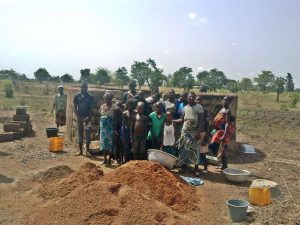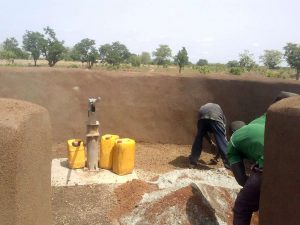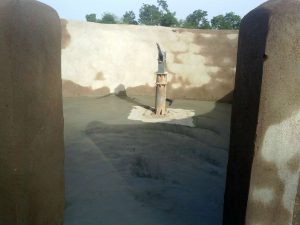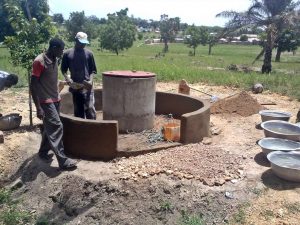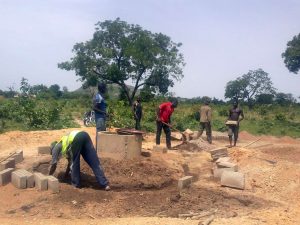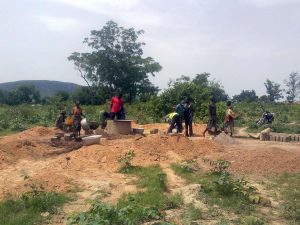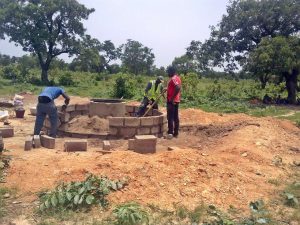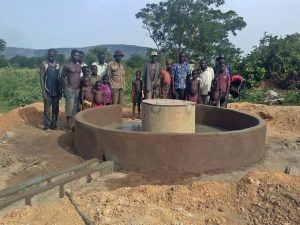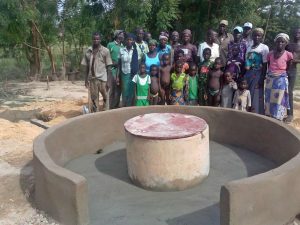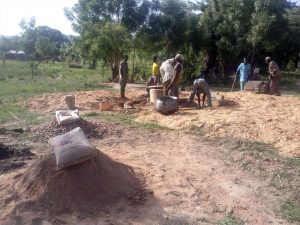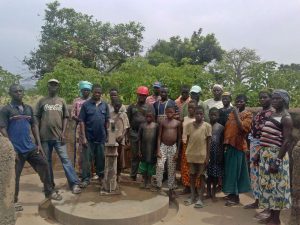This project has been completed under the direction of Peace Corps Volunteer Mokube Ewane.
The project was designed to dig 8 public wells, install 2 hand washing stations in public schools, and repair/rehabilitate 3 community water pumps. To read about the beginning of the project, CLICK HERE.
Mokube reports as follows:
The farther north you go in Togo, the more scarce water becomes. This is particularly true in northern villages that are farther away from the national road. Each time I go to visit AIDS patients in remote villages and have the time to chat with community members, all they could talk about is how scarce water is, and how they have to travel long distances to fetch it. Sometimes, the water they fetch may not be ideal for human consumption. However, that is all they have.
I have seen villagers, especially girls, fetch water in the same pond that animals such as goat, and cows drink from. Often times, the water contained in these shallow ponds is greenish, or yellowish in color. I was riding my bike from Kante (my post) to a nearby village, just to see and experience how life is over there. I came across a couple of children about 13 and 15 years old. They were standing next to a shallow pond of yellowish standing water. I asked what they were doing and they told me they were fetching drinking water. Just to be sure, I asked if that’s where they get their drinking water and their response was affirmative.
This situation is not unique to this village. Even in villages with access to a hand pump, when broken, it can take sometimes 4 years or more to get it repaired. I was a witness to three such villages with broken hand pumps since 2012. These pumps just got repaired in April 2016, thanks to our water project. People desperately wanted to get a reliable, potable and clean source of drinking water. Hence, my community and I had no choice but to undertake this water project. To correct myself, we had a choice: do nothing and let people continue to suffer or try to undertake a difficult and ambitious water project that will improve the living condition of thousands of people and save tens if not hundreds of lives each year. We chose the latter. At the end of the project, we were able to provide access to potable water to 17 communities (~5300 direct beneficiaries), thanks to Water Charity.
At first, people were a little skeptical about the notion of a potable water source next to them. However, when they realized that was a reality, their enthusiasm and excitement for the project couldn’t be exaggerated. After much planning and sensitization, the water project was officially launched in March 2016. With inputs from the Mayor’s office, local chiefs, quarter heads, community members and presidents of the various development committees, consensus was made to build or rehabilitate water wells and repair hand pumps in 17 communities (5 villages and 12 neighborhoods). At the end of the project, 12 brand new wells were built, two wells rehabilitated, three hand pumps repaired, and 1 hand pump repaired and rehabilitated (Totaling 14 wells and 4 hand pumps). These communities were chosen based on two main criteria: number of people in village (village population density), and degree of difficulty they face fetching water.
When the project began in the various sites, people couldn’t disguise their joy and happiness. They were very motivated to be part of this project. Some people came up to me and say “nous ne savons pas comment te remercier” (roughly translated to “we don’t know how to thank you”). Others will say “tu as sauvé nos vies (roughly translated to “you have saved our lives”). Apart from sand and gravel (community contribution), a lot of people were bringing food and local drinks for the workers working in the various sites. A lot of young people were also helping during the digging process. Without community members’ willingness to participate, this project couldn’t have been successful.
Our water project took approximately three months to complete (March 2016 to mid-June 2016). I’m proud to say that despite the many challenges we faced, such as transporting cement to remote locations, or organizing community members, this project was a success. Now, more than 5,300 people in 17 different communities have access to clean and potable water, and girls can now dedicate more time studying instead of traveling long distances to fetch water for their families. Many people, especially young children, don’t have to get sick because of the scarcity of obtaining clean water. Some women can now engage in income-generating activity because of a reliable water source. All these are made possible because of the generous financial support made by Water Charity.
We are grateful to Mokube for completing this excellent project. Although the project has been completed, we are still accepting donations to cover the funds we have advanced, so that we have money on hand to continue to work with PCVs in Togo on projects such as this one.
